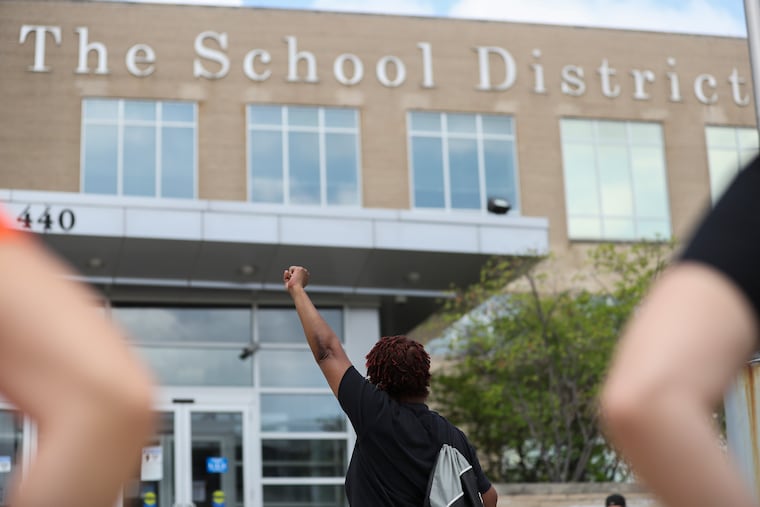Teachers, supporters take to the street for an all-virtual school opening, police-free schools
“Every single one is scared to send their kids back,” one teacher said of her students' parents.

Continuing a public drumbeat against any school reopening plan that brings children back to classrooms, several dozen teachers gathered Saturday to put pressure on the Philadelphia School District as it prepares to revise its back-to-school blueprint.
Under a blue sky and in hot, muggy conditions on the steps of the School District’s North Broad Street headquarters, teachers reiterated demands made at a dramatic school board meeting Thursday night into Friday morning: Don’t force one teacher or student into classrooms until you can guarantee our safety.
The district’s plan now seems to be “let’s cross our fingers that there are no deaths,” teacher Nick Bernardini said. “It’s preposterous.”
» READ MORE: Schools reopenings are a mess, home-schooling ‘pods’ are coming, and they could make inequality even worse
After an eight-hour school board meeting, Superintendent William R. Hite Jr. pulled his plan, which would have sent most children back to school in person two days a week and contained a 100% virtual option for families who wanted it. Parents, students, and teachers told Hite and the board that given the district’s track record with keeping buildings clean and safe, that plan was not OK.
“We will not allow one person to die as a result of people going back into these old buildings,” said Keziah Ridgeway, a rally organizer. “Not one death.”
Teacher Kelsey Romano said that on Friday alone, seven of her students’ parents reached out to her about school reopening. They all sent the same message.
“Every single one is scared to send their kids back,” said Romano, a special-education teacher at Saul High School.
» READ MORE: Philly’s school reopening plan has stalled. Now what?
Hite said in an interview that he heard and appreciated the forceful voices that spoke at the school board meeting and again on Saturday but that not every viewpoint was captured there and that two weeks ago, the majority of 36,000 people surveyed asked for a mix of in-person and remote schooling for most students.
“I’m also getting emails from families and from some educators who think that children should be in school,” Hite said. “Some people are essential workers and were not able to engage at the meeting.”
At Hite’s request, the school board recessed before taking a vote on the safety plan; the superintendent said that his team would work through the weekend on revisions but that a fully virtual school year would not be on the table, though he could ultimately present a phased-in approach, with classes starting virtually in September, then moving to a hybrid model, with plans for a fully face-to-face return when the science supports it.
“We will do harm to children if in fact we lose another year without children in front of adults in some form or fashion,” the superintendent said. “We know that our children who are most at risk suffered the most academically in the spring. As educators, we can do something about that, and we need to do something about that.”
Changes to the plan could mean the start of the school year, originally slated for Aug. 31 and now pushed back to Sept. 2, could be even later, said Hite.
Joyce Wilkerson, the school board president, said in a statement that Philadelphia is not alone in its challenges for designing a safe school reopening plan.
“Communities across our state and country are all grappling with the same question of how to carry out our responsibility to educate our children. This is a hard conversation, but it is a conversation we are going to continue to have.”
» READ MORE: ‘A lose-lose situation’: Schools try to plan their reopening amid conflicting coronavirus guidelines
Later, the teachers joined a swelling crowd for a march for police-free schools organized by the Philadelphia Student Union. The youth are calling for the district to divert the $31 million it spends annually on school safety into counselors, mental-health workers, and other student supports.
Raising fists into the air, they marched from LOVE Park back to district headquarters.
“What do we want? Police-free schools! When do we want them? Now!” the youth chanted, carrying banners, waving signs, and waving at cars that honked their horns at the crowd.
“Why do we, the Black community, always have to be over-policed?” Qawyyah Powers, a student at Science Leadership Academy at Beeber and a Philadelphia Student Union member, shouted into a microphone. “It’s because they label us as thugs, criminals, and thieves.”
The school board has committed to reforming but not eliminating its school police force, whose members have been renamed “school safety officers” and will be issued new uniforms. The district has said officers will be trained in trauma-informed practices and emphasize mentoring and supports rather than punitive measures.
The youth who took to the streets were unmoved.
“We’re tired of waiting for change to come that never shows up or doesn’t stay for long,” said Sanai Browning, a student at Science Leadership Academy at Beeber.